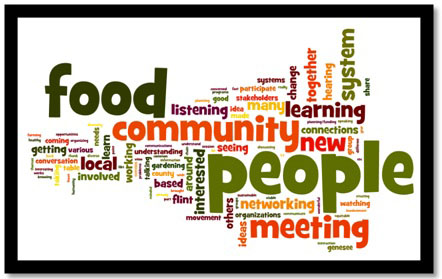Flint’s Food for Change Summit focuses on community-based food system
Group explores key issues surrounding food policies and priorities in community

The reason? Food and food sources have changed dramatically over the decades. For example, most U.S.-grown produce travels an average of 1,500 miles to get from farm to table. In addition, a significant chunk of our food is grown or raised outside the United States.
This, plus a host of other food-supply topics was the subject of discussions at the Food for Change Summit in Flint held Jan. 21. Summit organizers wanted to engage community partners to create approaches to issues around food accessibility in Flint with the ultimate goal of creating jobs and reducing illness caused by unhealthy diets.
Nearly 200 people – urban and rural farmers, government officials, gardeners and eaters from 3 to 80 years old, food processors, retailers and health care professionals came to the Food for Change Summit and took part in roundtable discussions and small-group sessions to discuss food policies, food and the economy, and community-based food. The goal was to begin identifying local food issues and to advocate for a community-based food system.
 The Food for Change Summit was planned by the Genesee County Food Policy Exploratory Group, which has been moving forward with planning meetings to enhance community food systems and economic development, and to explore the formation of a local food policy council. This group met regularly in 2011, eventually recognizing the need for an event to reach out to a wider audience in the city, county and beyond. The food served at the summit was all locally grown and/or raised, and it was inspiring to see what growers in this area produce in the middle of winter.
The Food for Change Summit was planned by the Genesee County Food Policy Exploratory Group, which has been moving forward with planning meetings to enhance community food systems and economic development, and to explore the formation of a local food policy council. This group met regularly in 2011, eventually recognizing the need for an event to reach out to a wider audience in the city, county and beyond. The food served at the summit was all locally grown and/or raised, and it was inspiring to see what growers in this area produce in the middle of winter.
Participants explored the cross-section between food and economy, food and policy and food and community. Participants were asked what the most valuable part of the summit was, and responses included: “Seeing how many people (diverse) are interested in this movement;” and “Meeting people who are interested in working together to change, improve food systems in an equitable, sustainable and economically viable way.”
Courses of action to explore in the future included advocating for the inclusion of food system issues in Flint’s new Master Plan, keeping the group connected, cooperative groceries and farms, access to capital for new farms and food-related businesses, access to healthy food and education. What was notable was that the Food for Change Summit engaged a new constituency of individuals into food system work, with 81% of attendees never having attended an Edible Flint (Flint’s urban agriculture network) or Food Policy Council Exploratory Group meeting before. A follow-up meeting will occur in late February.
The Food for Change Summit in Flint was sponsored by C.S Mott Group for Sustainable Food Systems at MSU, Local Initiatives Support Corporation (LISC) Michigan, Genesee County Farm Bureau, Ruth Mott Foundation and Michigan State University Extension.



 Print
Print Email
Email


